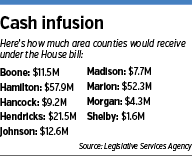Subscriber Benefit
As a subscriber you can listen to articles at work, in the car, or while you work out. Subscribe Now
 At the halfway point of the 2016 session of the General Assembly, the focus is on what lawmakers did—or actually didn’t do—about expanding civil rights to the LGBT community.
At the halfway point of the 2016 session of the General Assembly, the focus is on what lawmakers did—or actually didn’t do—about expanding civil rights to the LGBT community.
But moving along more quietly behind the gay rights chaos are bills that would pump more than $440 million into local governments this year.
Marion County alone would get a one-time check for $52.3 million under one of the proposals. Hamilton County would receive $57.9 million—more than any other county in the state—plus additional checks for $14 million in 2019 and 2020.
That’s money local officials could use in almost any way they wanted, at least under the bill moving in the House. A similar Senate allocates a little more money but requires that 75 percent be spent on roads.
Whatever the money will be used for, the amounts are significant, especially when its more common for local officials to be begging lawmakers not to take money away or impose an unfunded mandate.
But before you start thinking lawmakers have gone all soft or interpret these proposed payouts as big windfalls for local governments, consider this: The money already belongs to them. It’s income tax revenue the state collected on behalf of locals but have not distributed to them.
This is a complicated system to explain. But here’s the gist: The state distributes income tax revenue to local governments each year based on estimates, not actual collections. That’s primarily because companies estimate how much workers will owe, they withhold that much from paychecks all year, then taxpayers file returns, that act as a sort of true-up. Some taxpayers get money back; some pay more.
 So it takes roughly two years for the state to know how much it truly collected on behalf of a local government in any given year. The state makes adjustments in local distributions along the way to account for the differences between the estimates and the actual revenue collected.
So it takes roughly two years for the state to know how much it truly collected on behalf of a local government in any given year. The state makes adjustments in local distributions along the way to account for the differences between the estimates and the actual revenue collected.
But during recessions, this system of estimates and true-ups can get pretty out of whack and local governments can find themselves owing the state some big bucks. So in 2011, the state began withholding local tax revenue when times were fairly good to create reserve accounts for each county. That way, when bad times rolled around, the state could use the revenue in reserves to even out tax distributions.
Turns out, though, the state has been withholding a lot—at least for those counties where population and income growth means revenue is routinely beating expectations. Now, lawmakers want to give much of those reserve funds back.
The Senate plan would give back all the money the state owes to cities, towns and counties. Three quarters would have to be used for transportation projects; the remaining could be for any purpose the income tax was originally designated for.
The state would then begin building back up the reserves—although to a lower point than under current law.
The House plan, meanwhile, gives back 86 percent of the revenue and lets local governments do anything with the money allowed under those same income tax ordinances. It keeps the remaining money in the reserve funds but prevents them from building too high by authorizing supplemental payouts when reserves top 15 percent of the unit’s estimated distribution.
Under both bills, every county but Vermillion—which is essentially repaying the state for funds fronted during an economic downturn—would get some cash, although in general growing counties and those with higher incomes will benefit the most. That’s why Hamilton County is getting the biggest payout, at least in raw dollars.
Some Democrats have said that’s not fair (although the House bill passed unanimously). “The rich are getting richer,” said Rep. Greg Porter, D-Indianapolis. “The counties that don’t need the money are getting the most.”
Rep. Terry Goodin, D-Crothersville, even proposed that the state just give the money back to taxpayers rather than giving it to local governments. He suggested that local governments in growing counties were collecting more money than they needed.
But what’s missing from those comments is the understanding that locally elected officials imposed the tax rates. They made decisions in public meetings about how much to collect and what to use the money for. And yet they’ve been hamstrung by a system that withholds millions of dollars from them.
Of course, the reserve system is not without merit. There are good reasons to hold back cash during good times to even out falling distributions during bad ones. But advocates of the legislation say the state has been withholding too much and it’s time to give some of it back.
The only question now is how much and for what purpose.•
__________
Lesley Weidenbener covered the Statehouse for two decades. She is now IBJ’s managing editor.
Please enable JavaScript to view this content.
